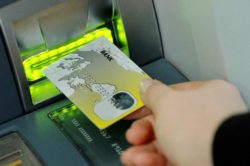Top Class Actions’s website and social media posts use affiliate links. If you make a purchase using such links, we may receive a commission, but it will not result in any additional charges to you. Please review our Affiliate Link Disclosure for more information.
When deciding where to keep their money, many consumers only consider traditional banks. Though widely popular with those who use them, credit unions are a lesser-known option.
Overview: Credit Union vs. Bank
So how do consumers decide between a credit union and a bank? While the financial institutions are similar, there are some major differences, such as ATM fees, that may make one or the other more appealing depending on each individual’s personal financial goals and needs.
Consumers deciding between a credit union and a bank may want to evaluate whether low interest rates or low fees are more important to them, or whether they frequently use ATMs or prefer to go inside a branch to withdraw funds.
What Is the Difference Between Credit Union and a Bank?
There are several ways that credit unions differ from traditional banks. Traditional banks are often large, for-profit institutions, while credit unions are generally much smaller non-profits that are member-owned, cooperative organizations. This means that unlike banks whose shareholders receive a portion of the profits, credit unions pass profits to members.
Another key point in the credit union vs. bank discussion is who qualifies to become a member. While almost anyone can walk into a bank and open an account, it may be a bit trickier to become a member at a credit union.
Credit unions are often created to serve a specific community. To become a credit union member, there may be specific criteria, such as requiring that members work in a certain occupation, live in a certain region, or are associated with a certain company or organization, such as a church or the military, in order to qualify. These requirements are known as “fields of membership”.
What Are Credit Union Benefits?

Other credit union benefits may include higher rates of return on investments and lower costs associated with managing your money. Credit unions often pay higher interest rates on checking and savings accounts, in some cases as much as 10 times what a traditional bank would offer.
Additionally, most credit unions have lower fees than traditional banks, with some credit unions offering free checks, withdrawals, and electronic transactions. Credit unions that charge for bounced checks, overdrafts, or ATM transactions often assess lower fees compared to regular banks.
In addition to ATM fees, consumers deciding between joining a credit union and a bank may also want to weigh the cost of other fees. Overdraft fee scales vary by financial institution, as do fees for paper statements and excess activity. In some cases, consumers may not even be aware of these fees until they see them on a statement.
Which Charges Higher ATM Fees?
Both credit union members and bank customers can use ATMs to withdraw money or make other transactions. Since larger, traditional banks tend to have more ATMs throughout a given city, customers of these banks may be less likely to pay out-of-network ATM fees. Though credit union members may be assessed out-of-network ATM fees more often, they may actually end up paying less in fees than traditional bank customers due to a common credit union practice of ATM fee reimbursement.
Some credit unions automatically credit ATM fees to members’ accounts at the end of each statement period, while others reimburse members up to a pre-set amount. The national average fee for using an out-of-network ATM is nearly $5, so getting reimbursed for the charges may result in significant savings for members.
In some cases, credit unions reimburse members for ATM fees so long as certain requirements are met, such as using online banking a certain number of times per month, making a certain number of direct deposits, using a debit card or check card a set number of times in a month, for example.
While many big banks do not offer ATM fee reimbursement, some online banks have begun doing so. Online Ally Bank and Bank of Internet USA automatically reimburse ATM fees at the end of each month.
How Can I Avoid ATM Fees?
Regardless of where you stand on the credit union vs. bank choice, there are steps you can take to avoid unwanted ATM fees.
The first and easiest way to avoid unwanted ATM fees is to use an in-network ATM. This includes machines at your bank, at other bank locations, or at third party locations which indicate that they will not charge you a fee. Your bank’s website and app should have a way for you to look up in network ATMs.
Financial experts also recommend choosing banks wisely. Some banks have no ATM fees as a part of their agreements while others are part of a “co-op ATM network” in which a large network of ATMs are available for use with no surcharges.
Another way to avoid ATM fees is to go directly to your bank location to withdraw funds. Although this process takes longer than an ATM transaction, it may be a way for consumers to avoid ATM fees if there are no in-network ATMs near them.
Similarly, consumers can get cash from their bank account by using store’s cash back options. On many modern day payment systems, consumers have the option to withdraw cash and have it charged to their account as part of their transaction.
By using alternative withdrawal methods or even keeping cash on hand, consumers can avoid unnecessarily needing to use an ATM to withdraw cash on the fly.
Although these tips can help avoid ATM fees, some credit unions and banks may use deceptive methods to charge ATM fees. Bank of America faced a lawsuit over unfair fees, and some credit union members have reported being assessed ATM fees without being notified that a fee would be charged.
When attempting to use an out-of-network ATM, a warning will generally pop up, alerting the credit union member to the cost of a fee for using the machine. Financial laws protecting consumers who manage their finances online prohibit charging hidden fees for ATM withdrawals or transfers without first notifying the customer.
In many cases, two fees are charged to use an ATM. One fee may be assessed by the financial institution that owns the ATM in order to cover the costs of operating the machine. This fee may be several dollars. Additionally, your own bank or credit union may assess a fee when you use an out-of-network ATM. Many consumers are not aware that they are being charged two fees for withdrawing their own money.
If you have been charged ATM fees without being notified, you may be eligible to speak with an experienced attorney about your legal options. Some people who have been charged undisclosed fees may be eligible to join or file a class action lawsuit and pursue reimbursement and compensation for these charges.
Join a Free ATM Fees Class Action Lawsuit Investigation
If you were charged ATM fees without notification when you used an ATM machine, you may qualify to join this ATM fees class action lawsuit investigation.
This article is not legal advice. It is presented
for informational purposes only.
ATTORNEY ADVERTISING
Top Class Actions is a Proud Member of the American Bar Association
LEGAL INFORMATION IS NOT LEGAL ADVICE
Top Class Actions Legal Statement
©2008 – 2024 Top Class Actions® LLC
Various Trademarks held by their respective owners
This website is not intended for viewing or usage by European Union citizens.
















5 thoughts onCredit Union vs. Bank: Which Charges Higher ATM Fees?
Our credit union was charging OD fees and we had a Overdraft protection acct! But, instead of taking the fees out of this account, they would take it out of our savings acct and send us a statement that they needed us to deposit the OD fee into the checking account to cover them? So my Mom would go straight to the bank and deposit the amount and they’d add it to her account and never take it off deposit it back to the overdraft protection acct or the savings acct? So, my Mom was getting charged for the OD fees twice! And had no savings and making payments of $30. 00 a month on the OD protection acct! The only reason why she had OD fees, after my Mom started showing signs of Dementia, she asked me to take over her accts and when I did I asked for past statements to see what was going on in her accts? They would only give me 5 years of past statements? But, that was really all I needed! I found out that two of her credits were drafting her acct twice a month for monthly payments and the bank was listing what one of the drafts was for, but showing a check number without who the check was paid to? And every month there would be a check or two listed with an asterisk beside it in the list of paid checks for the month? I saw that they were listed as out of sequence checks? And I couldn’t believe that no one had investigated them? They were not in the sequence of checks we were in? But, future checks we were not yet into? I got a member services lady, and I have her name, to call one of the companies to see who it was and why they were drafting two monthly payments out each month? Come to find out on the statements they showed that they drafted payments and a thank you! And the same statement that listed another payment amount for an over the phone payment, and thank you! The first drafted was the correct amount of monthly payments! The second entry was listed on our statement as the out of sequence checks and the amounts were within a few dollars different than the drafted payments? And all out of sequence checks never listed who checks were paid to? I had to get the credit union to send me another copy of the statements listing the payee of all checks listed without one? That’s when I realized that there were several creditors taking out two payments a month? I asked the member services lady to research this and she said she would and would call me back? She didn’t and I asked to close the acct after I couldn’t get any help and the same lady handled the transaction and I stated I wanted absolutely NO DRAFTS and said I would personally pay each month payment myself by check myself! It took me three times paying to bring the acct back to zero, to close out the account because of the drafts coming in? The last time it was so close to Mom’s two deposits to be deposited to her checking acct and the lady said that she’d make sure that she kept an eye out for the deposit and make sure it was delivered to the correct account? She didn’t and it went back and then we had to wait until it was resent? But in the meantime an overdraft was applied because of a draft! The draft was for the Credit Unions Credit card acct? When my Mom passed in 2020, and I became Personal Representative for the Estate of my Mom, the Credit Union put a claim on the Estate and had closed the account before I’d even had a chance to look at it? I know she had stocks and the credit card had about a $10,000.00 balance! She hadn’t used it in years? Luckily, I questioned it because it had life insurance on it! So paid off! But, they waited too long to turn in the claim so it was denied also! But, they took money from my Mom’s acct and I have been in probate almost 3 years trying to fight for my home my Mom left me and I’m the only heir left! And the mortgage company has fraudulently defaulted me and after I’ve qualified for an almost $8,000.00 home rescue grant from my state, mortgage company admitted I was not in default but is not correcting my acct and lowering my payment back down and has told me that if I want to find out what happened to the life ins my Mom had on the mortgage that the mortgage company told me she did and said they were investigating and would put the title in my name back in Jan of 2021? She told me I’d have to hire a lawyer to find out that information! The Deed and property taxes are already in my name! Thank you, Marian E Walker
Both charge fees. Add me.
Please add me..
Please add me
They are starting to be about the same now.